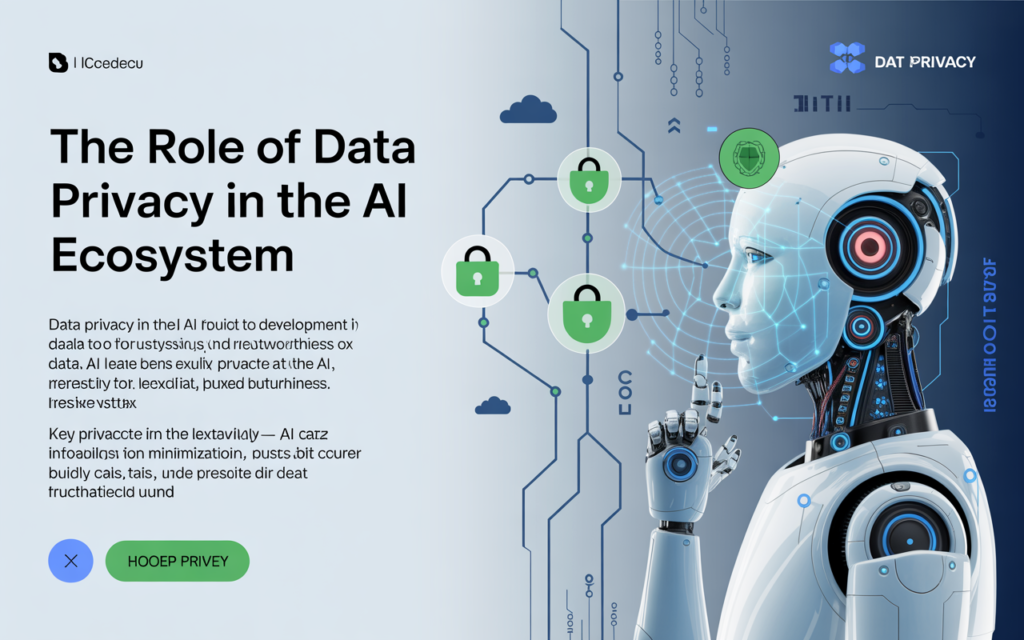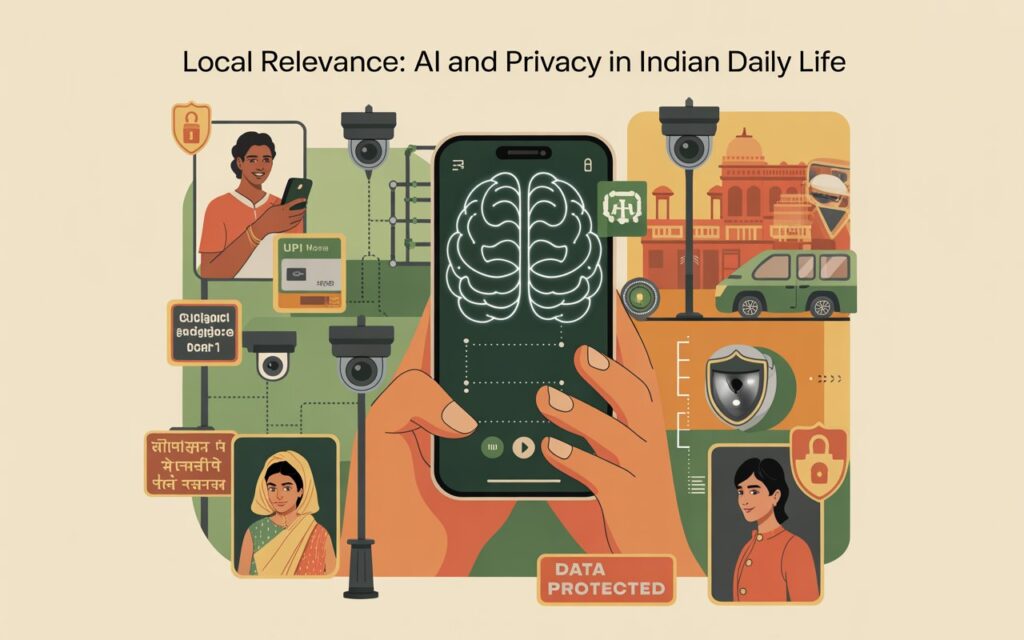Introduction
AI and Data Privacy are becoming increasingly important topics in India as the country rapidly adopts digital technologies.. With government initiatives likes Digital India and the rise of AI-powered platforms, data privacy is now a major concern for both individuals and organizations.. While Artificial Intelligence boosts efficiency and innovation, it often to collects and processes large amounts of personal data.. This raises questions about how to safeguard citizens’ information while still benefit from technological advancements.. In this article, we will explore the challenges, solutions, and future of AI and data privacy in India..
What is AI and Why is It Important in India?
Artificial Intelligence (AI) refers too computer systems designed to perform tasks that normally require human intelligence.. These include speech recognition, decision-making, and data analysis. In India, AI is being adopted across sectors such as healthcare, agriculture, education, and governance. Government programs like the National AI Mission aim to make India a global hub for AI innovation. However, as AI grows, so does the importance of handling personal and sensitive data responsibly..
The Role of Data Privacy in the AI Ecosystem

Data privacy is the right too control how personal information is collected and used.. In an AI-powered environment, algorithms rely heavily on user data to function effectively.. This means that maintaining data privacy is crucial too preventing misuse,, identity theft, and surveillance.. For Indian users, data privacy is not just a technical issue but also a cultural and social one.. Legislation like the Digital Personal Data Protection Act 2023 is a step in the right direction to protect citizens..
Key Statistics on AI and Data Privacy in India
Here’s a quick look at some current data:
| Metric | Value |
| Internet Users in India (2025 est..) | Over 900 million |
| AI Market Size (India, 2025) | $7..8 billion USD |
| Data Breach Incidents (2024) | 120+ major breaches |
| % of Indians Concerned About Privacy | 78% |
| Adoption of AI in Govt Services | 60% of central services |
These numbers show the growing need to balance innovation with robust privacy measures..
Challenges in Balancing AI and Data Privacy
There are several roadblocks in creating a secure yet innovative AI ecosystem in India:
Lack of Awareness
Many users are unaware of how their data is being used.. This makes them vulnerable to misuse..
Weak Data Infrastructure
India is still building a solid framework for data protection.. Until it’s fully established, AI systems may operate with minimal oversight..
Ambiguity in Regulations
Although laws like the DPDP Act exist, their enforcement is still in early stages.. Startups and SMEs struggle to comply without clear guidelines..
Technological Gaps
Not all AI developers incorporate privacy-by-design, especially in low-cost applications or apps targeted at rural users..
Ethical Dilemmas
Should an AI system be allowed to make decisions using personal data, even if it improves efficiency? This ethical concern needs to be addressed..
Read more: AI in healthcare is dramatically transforming the medical industry in 2025,, especially in India.. From predictive diagnostics to robotic surgeries,, artificial intelligence is making healthcare more accessible,, efficient,, and personalized.. With a growing population and increasing medical demands,, India stands to benefit immensely from this technological evolution.. Government initiatives,, startup innovations,, and global collaborations are fostering an ecosystem where AI thrives.. This article explores the major ways AI is revolutionizing healthcare in India today.
Solutions and Best Practices
India must adopt a multi-faceted approach to safeguard AI and data privacy:
Stronger Regulations
Proper enforcement of the Digital Personal Data Protection Act is crucial.. More transparency is needed in how AI algorithms use data..
Localized AI Models
Using AI models trained on localized Indian datasets can reduce dependency on foreign platforms and increase control over data usage..
Awareness Campaigns
Public campaigns should educate users about data rights, similar to the government’s efforts on cybersecurity..
Privacy-by-Design Architecture
Companies must integrate privacy features during the design phase of AI products, not as an afterthought..
Ethical AI Guidelines
Development and use of AI must align with ethical standards specific to Indian culture and values..
Government and Industry Collaboration in India
Indian ministries are already working with tech companies to enhance privacy and AI governance.. The Ministry of Electronics and IT (MeitY) has launched sandboxes for testing AI models.. Public-private partnerships are helping to draft clearer AI ethics guidelines.. Global firms like Google and Microsoft are also collaborating with Indian universities to create privacy-preserving AI tools.. This collaboration is essential to balance security and innovation..
Local Relevance: AI and Privacy in Indian Daily Life

From Aadhaar authentication to UPI transactions, Indians interact with AI daily.. Voice assistants like Alexa and Google Assistant use AI to enhance convenience.. However, they also collect data that could compromise user privacy.. Awareness about how these technologies operate is essential.. Visit Meri Kahani to read more stories about how AI is impacting Indian lives..
FAQs on AI and Data Privacy
1.. What is the link between AI and data privacy?
AI systems often collect and analyze user data, making data privacy crucial to avoid and ensure trust..
2.. How does India regulate AI and data privacy?
India introduced the Digital Personal Data Protection Act 2023 too safeguard user data in digital platforms..
3.. Are AI apps safe to use in India?
Most are safe, but always check privacy policies and permissions before installing AI-based applications..
4.. Can AI function without accessing personal data?
Some forms can, using anonymized data or synthetic datasets to minimize privacy risks..
5.. What are privacy-by-design AI models?
These models embed privacy features into the AI system from the beginning of the development process..
6.. Is my Aadhaar data used in AI applications?
Only authorized apps can access Aadhaar data, and misuse is punishable under Indian law..
7.. What should I do if I suspect a data breach?
Report it to CERT-In or use government platforms to lodge privacy complaints..
8.. Which Indian companies lead in privacy-focused AI?
Startups like Innefu Labs and global giants like Infosys are leading efforts in ethical AI development..
9.. How is AI used in Indian agriculture with privacy?
AI-driven platforms are used for crop monitoring, but they focus on anonymized and consent-based data..
10.. Where can I read more about AI and tech in India?
Explore more articles on Meri Kahani for Indian tech updates and insights..
Read more: As artificial intelligence becomes more powerful, it is also becoming harder to understand.. Many AI systems make decisions in ways that are not always clear to users.. This lack of transparency creates confusion and mistrust.. That’s where explainable AI plays an important role..
Conclusion
Balancing AI and data privacy is not just a technical challenge but a national necessity for India.. With the right regulations, public awareness, and ethical standards, India can lead the world in responsible AI innovation.. At Meri Kahani, we are committed to educating Indian users about the intersection of technology and human values.. Join us in building a secure and innovative digital India..
